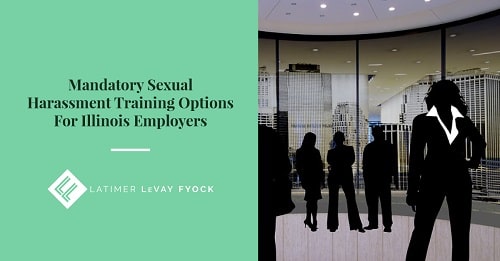Mandatory Sexual Harassment Training Options For Illinois Employers

Even though it may feel like it has been six years instead of six months since New Year’s Day 2020, the year is, in fact, only half over. However, the next six months can still fly by quickly. That means Illinois employers that have not already done so need to get in gear now to satisfy many of their new obligations under the sweeping changes to the Illinois Human Rights Act (the “Act”) that became effective on January 1 of this year. This includes conducting mandatory, and compliant, sexual harassment prevention training for all employees by December 31, 2020.
Because the Act now applies to every Illinois employer, you need to provide the training required under the Act even if you are doing so for only one employee. Employers have options when it comes to who will conduct the program and how it will occur. Companies can hire third-parties to provide the needed annual training (at a cost), or they can do it themselves so long as their program equals or exceeds the minimum standards set forth in the Act.
However, many companies have held off on making a decision about which avenue to take. Part of that was a result of the upheaval caused by the COVID-19 pandemic. However, employers were also waiting on the Illinois Department on Human Rights IDHR) to develop a long-promised model sexual harassment prevention training program that they could use with confidence to conduct compliant training. Now that IDHR has finally released its model program, employers can and should decide how to proceed.
Who Must Receive Training
Employers must provide training every calendar year to all full-time, part-time, and short-term employees, as well as interns. They do not need to administer a program for independent contractors. However, IDHR “strongly advises” that “independent contractors receive training if they are working on-site at an employer's workplace or interact with the employer's staff.”
Additionally, it does not matter whether a company is based outside of Illinois. If it has employees who work or will work in Illinois, those employees must participate in the training.
Minimum Program Requirements
The annual sexual harassment training required under the Act must include:
- an explanation of sexual harassment;
- examples of conduct that constitutes unlawful sexual harassment;
- a summary of relevant state and federal laws prohibiting sexual harassment and the remedies for violations of these laws; and
- a summary of the employer’s responsibility to prevent, investigate, and correct sexual harassment.
In addition to the foregoing requirements, restaurants and bars must also provide supplemental sexual harassment prevention training that includes presentations about specific conduct, activities, or videos related to the restaurant or bar industry as well as an explanation of manager liability and responsibility under the law. Employers in the sector can download this handout for additional specifics about supplemental training and compliance.
Recordkeeping Obligations
The Act requires that employers maintain records affirming that all applicable employees have completed the program in each calendar year. Companies must make such records available for inspection by IDHR upon request. This record, which may be either paper or electronic, can consist of a certificate or a signed employee acknowledgment or course sign-in worksheet.
Businesses that fail to comply with the Act’s training requirements will be given 30 days to do so, or else face civil penalties ranging from $500-$1,000 for the first offense.
Call Us With Your Sexual Harassment Prevention Training Questions and Concerns
The decision as to whether to conduct training yourself or retain a third-party to do so will depend on your company’s resources and priorities. While administering a program in-house won’t involve writing a check, it could be a significant and time-consuming burden on the human resources representative or other individual tasked with the responsibility.
If you have questions or concerns about your company’s obligations under the revised Illinois Human Rights Act, including sexual harassment prevention training, please contact the employment law attorneys at Latimer LeVay Fyock for guidance and assistance.


